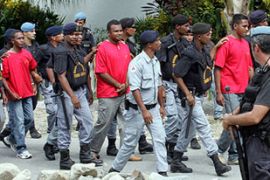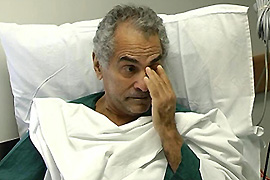Ruling due on East Timor rebel plot
Court to deliver verdicts on 28 alleged rebels accused of trying to kill president.

Gusmao escaped unharmed from an ambush on his convoy later the same day.
Following the assassination attempt, a state of emergency was declared in East Timor while the country’s defence force joined Australian-led foreign troops on a manhunt for the attackers.
Adrian Brown, a journalist for Australia’s Channel Seven network who is in Dili, told Al Jazeera that there was tight security outside the court ahead of the verdicts, amid fears of a backlash from rebel supporters.
‘Key player’
Among the accused is Angelita Pires, the East Timor-born Australian girlfriend of rebel leader, Alfredo Reinado, who was shot dead by presidential guards during the first attack.
 |
| Ramos-Horta was shot several times and nearly died of his wounds [Reuters] |
She faces up to 20 years in prison if found guilty.
Prosecutor Felismeno Cardoso said at the close of the case last month that Pires was a key player in the plot as she made several trips to the northern Australian city of Darwin to raise funds for the rebels.
Cardoso said that Pires, who holds dual citizenship, had encouraged the attack and had said it should be made to look like a coup.
On Tuesday Pires’ lawyer, Jon Tippett, insisted on her innocence saying the verdict “will be a good one for us if the case is decided on the evidence”.
“We brought forward scientific evidence and other evidence to show that our client is clearly innocent of the counts that have been brought against her,” he said.
Deserters
The accused also include Gastao Salsinha, who replaced Reinado as rebel leader and is accused of commanding the failed attack on Gusmao.
The defendants are mostly army and police deserters who turned rebels after factional rivalries within East Timor’s security forces erupted into violence in 2006, killing dozens and toppling the then government.
The rebel group comprising some 600 soldiers complained that they had been discriminated against because they were from the western part of East Timor
Damien Kingsbury, a professor of international studies at Deakin University in Australia, said the trial is the greatest test of East Timor’s judiciary since the territory separated from Indonesia in 1999, gaining formal independence in 2002.
He said that whatever the outcome, East Timor’s justice system will be criticised because it is widely perceived as incompetent, but not corrupt.
“The judiciary is under a great deal of scrutiny at the moment and this is easily the single most important case to have ever gone before it,” Kingsbury told The Associated Press.
“I don’t think the reaction will go beyond a bit of active debate,” he said, disagreeing with predictions that the verdicts could spark violence in the capital.